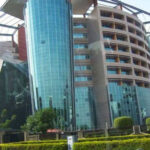
The telecommunications industry has undoubtedly witnessed tremendous growth and development in Nigeria. It is a sector that directly impacts every aspect of human life, business, education, governance, family, entertainment, etc. Growth in the industry was slow for several years after Nigerian Independence. The total telephone subscriptions from Independence in 1960 to 2001 was a paltry 400,000 connected analogue lines, translating to a teledensity of 0.04%. This number of telephone lines was considered inadequate for a population of 126.2 million in 2001, according to the World Bank, when the Nigerian Communications Commission (NCC) licensed the Digital Mobile Operators.
Before the advent of digital mobile service in the country, applicants for telephone lines waited for years to get a telephone line. The waiting time in some cases was up to ten years. Customers who needed to make international calls went to the international call centre at NECOM House Marina, Lagos, to make such international calls. As a young Commercial officer in the Nigerian External Telecommunications (NET) Limited in 1982, I witnessed parents from different parts of the country come to NECOM House on Marina, Lagos, to make international calls to their wards overseas. NET Limited Call centre was one of the few locations where customers could make international calls. The only exceptions were some embassies, oil companies and international banks, and a few individuals with International Direct Dialing (IDD) and Alternate Voice and Data (AVD) services.
Generation Zs (people born between 1981 – 1990) and Generation Alpha (born between 2010 – 2020) would find this amusing; it sounds more like a fairy tale. Yes, those were the days we were still in the dark. The situation persisted even after the emergence of the Nigerian Telecommunications Limited (NITEL) in 1985. The military government formed NITEL through the merger of Posts and Telecommunications (P&T), responsible for domestic/national telecommunications services, with NET Limited, responsible for international telecommunications services.
I can vividly recall that at NITEL, Shomolu Exchange, where I was the Business office Manager, the organisation processed applications under what was then known as “Capital contribution”, a scheme where applicants contributed various sums of money, depending on location, to get NITEL services extended to their homes and offices.
In realisation of the challenges, and the inability of NITEL, as a monopoly, to provide enough telephone services in the country, the then Military government promulgated Decree 75 of 1992, establishing the Nigerian Communications Commission (NCC) as the industry regulator for telecommunications. The establishment of the NCC set the pace for the deregulation of the sector—the then Minister of Communications’ Engr. Olawale Ige played a vital role in the deregulation exercise. Engr. Ige in the year 2000, eventually became a member of the Board of Commissioners at the NCC.
The Decree specified the following, among others, as the functions of the NCC. Facilitate investments in and entry into the Nigerian market, protect and promote the interest of consumers against unfair practices, and ensure that licensees implement and operate the most efficient and accurate billing system at all times. Other functions include:
Promoting fair competition in the communications industry.
Protecting communications services facilities.
Preventing service providers from misusing market power or anti-competitive and unfair practices, among others.
The Decree further stated the objectives of the Commission to include the promotion and implementation of the national telecommunications policy, establish the regulatory framework for the Nigerian Communications industry and promote the provision of modern, universal, efficient, reliable, affordable, and easily accessible communication services. Some other objectives mandate the Commission to encourage local and foreign investments in the Nigerian communications industry, introduce innovative services and practices in the sector, encourage fair competition, and promote Nigerian participation in the ownership, control, and management of communication companies and organizations.
The Nigerian Communications Act set the above objectives to ensure a vibrant communications sector, with functions and purposes necessary for a potent independent regulator. Industry watchers believe that the Commission’s performance in regulating the industry depends on its ability to align actions with the objectives.
At the return of democratic governance in 1999, the government of President Olusegun Obasanjo was keen on transforming the communications sector. President Obasanjo personally invited investors to invest in the industry during his diplomatic shuttles. Nigeria was smarting from the effect of military governance. The developed countries were still uncertain of the safety of investments in the country due to prolonged military rule. Some major global telecommunications companies, like Vodafone and others, spurned the invitation, showing a lack of interest in the Nigerian telecommunications market. The international community still viewed the country as a pariah at that time.
Despite the lukewarm attitude received from some international investors, the government was determined to confront these challenges. In a demonstration of its commitment, a Board of Commissioners was constituted for the Nigerian Communications Commission, Chaired by a renowned technocrat, Alhaji Ahmed Joda, and the former President of the Association of Telecommunications Companies of Nigeria (ATCON), a technocrat, an astute engineer, Dr Ernest Ndukwe, FNSE, as the Executive Vice-Chairman and Chief Executive of the Commission. The other members of the Board were Engr. Olawale Ige, former Minister of Communications, Austine Otiji, former MD of NITEL, Engr. Patrick Kentebe, Engr. Shola Taylor, Engr. Isaiah Mohammed, Engr. Zimit, Engr. Don. Udeh, among others.
To be continued tomorrow
Ojobo, PhD, former Director of Public Affairs, Nigerian Communications Commission, and President African ICT Foundation wrote from Abuja.













